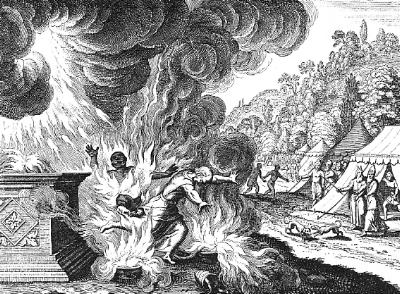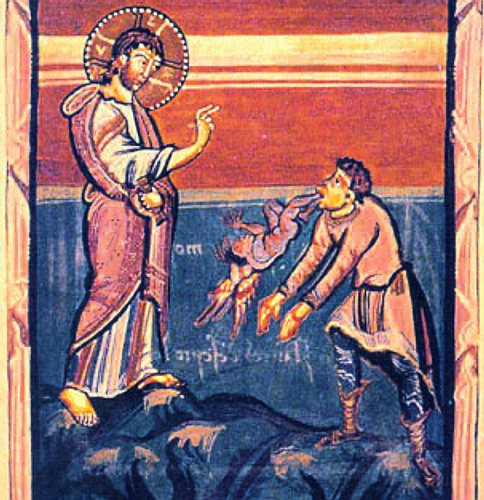Reference links:
Old Testament
Do you have the general process of animal sacrifice memorized yet? If not, you get another chance today! For the sin offering: put blood on the horns of the altar, pour out the rest at the base, burn the fat, kidneys, and long lobe of the liver. Burn the rest outside. For the burnt offering: spatter bloods against the sides of the altar. Burn the pieces of the animal and be sure to wash the internal organs and the legs. For the peace offering: splatter the blood against the sides of the altar. Take all the fat, the kidneys, and the long lobe of the liver and burn all these things on top of the breasts.
This round of sacrifices serves the purpose of purifying the people before God interacts with them directly.
Fire blazed forth from the Lord’s presence and consumed the burnt offering and the fat on the altar.
Awesome! Who doesn’t like fire? Well, it appears that God is at least picky about what kind of fire is burned in his presence:
Aaron’s sons Nadab and Abihu put coals of fire in their incense burners and sprinkled incense over them. In this way, they disobeyed the Lord by burning before him the wrong kind of fire, different than he commanded. So fire blazed forth from the Lord’s presence and burned them up, and they died there before the Lord.
Ugh, once again we see that the Biblical God is a primitive, evil, control freak. Aaron stands there in stunned silence while Moses blathers on about God’s holiness. Moses then tells Aaron and his remaining sons that if they mourn for the lost brothers, they will also die and God will strike at the whole community of Israel.
New Testament
More parables today. In most of the parables that involve farmers and seeds, it seems like we are supposed to take the farmer to be God/Jesus. Today we read a parable where such an interpretation is not obvious:
The Kingdom of God is like a farmer who scatters seed on the ground. Night and day, while he’s asleep or awake, the seed sprouts and grows, but he does not understand how it happens. The earth produces crops on its own. First a leaf blade pushes through, then the heads of wheat are formed, and finally the grain ripens. As soon as the grain is ready, the farmer comes and harvests it with a sickle, for the harvest time has come.
This parable supports my standard interpretation in so far as it is the farmer who performs the harvest and plants the seed. However, the bits about the farmer not understanding how the seed grows into plants do not seem consistent with that interpretation. If the parable is supposed to be about spiritual growth and the farmer is supposed to be oneself, the bits about sleeping and lack of understanding make more sense, but the bits about planting and harvesting make less sense. Overall though, the second interpretation makes more sense.
Jesus demonstrates his power to calm storms and freaks out the disciples. I think it is kind of funny that the disciples accept healings as miraculous but acceptable, but affecting the weather leaves them “absolutely terrified”. I would think after seeing the former, the later would be surprising but not that surprising.
Jesus drives the demons into the pigs. In Matthew 8:28-34 Jesus drove demons out of two men. In Mark, there is only one man possessed by many demons. The interaction between the demon possessed man and Jesus is interesting enough that I want to quote it at length:
When Jesus was still some distance away, the man saw him, ran to meet him, and bowed low before him.With a shriek he screamed, “Why are you interfering with me, Jesus, Son of the Most High God? In the name of God, I beg you, don’t torture me!” For Jesus had already said to the spirit, “Come out of the man, you evil spirit.”
Then Jesus demanded, “What is your name?”
And he replied, “My name is Legion, because there are many of us inside this man.” Then the evil spirits begged him again and again not to send them to some distant place.
There happened to be a large herd of pigs feeding on the hillside neraby. “Send us into those pigs,” the spirits begged. “Let us enter them.”
So Jesus gave them permission. The evil spirits came out of the man and entered the pigs, and the entire herd of about 2,000 pigs plunged down the steep hillside into the lake and drowned into the water.
The demons clearly seem to fear Jesus and his power. What is more interesting is that Jesus seems to be willing to listen to their pleas and send them into the pigs instead of sending them wherever he would have sent them otherwise. Also interesting, what happened to the demons after they drowned the pigs they were possessing? Did they just go on to possess someone/something else? Did Jesus even care? Based on this story, it seems to me that Jesus’ main objection to demons is that they reveal that he is the son of God. He does not really care about preventing them from hurting people or causing damage.
Psalms and Proverbs
More of the same from both Psalms and Proverbs. Both can be summarized by two verses from today’s reading from Psalms:
Look at those who are honest and good,
for a wonderful future awaits those who love peace.
But the rebellious will be destroyed;
they have not future.
All of this talk of wickedness leaves me confused though. Some parts of the Bible obviously condemn me as wicked. I do not believe in God, I commit blasphemy against the Holy Spirit whenever I feel like it, I have not made God’s law my own, I do not put my hope in the Lord. According to many of the psalms and proverbs, I should, therefore, be doing a lot of things I do not do. I do not “wait in ambush for the godly, looking for an excuse to kill them.” I do not have violent intentions. I do not think evil thoughts all the time. So, am I wicked or not? I am very confused.

